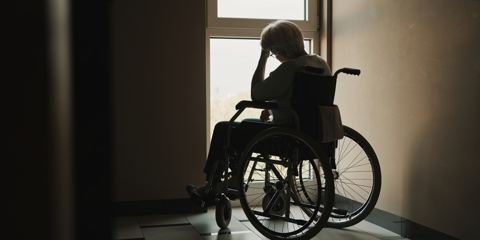When most people think of abuse, they tend to imagine physical abuse, which consists of hitting, slapping, kicking, or otherwise physically harming someone. However, there are other kinds of abuse that can cause harm to a person, especially an elderly one. It is called emotional abuse.
When you were growing up, you may have heard the phrase “Sticks and stones may break my bones, but words can never hurt me.” There is no truth to that popular saying. Words do hurt. Threats, insults, and other negative words and phrases can cause a person to be humiliated or even scared for their life.
You have probably heard of bullying victims committing suicide over the emotional harm they have faced. That is how serious it can be.
Even in a nursing home environment, emotional abuse can victimize a resident. They may feel humiliated and even try to avoid certain people. They may isolate themselves and show changes in personality that are concerning to their loved ones.
Here is a look at what emotional abuse entails and the forms of assistance a victim can receive to deal with this situation.
What is Emotional Abuse?
Emotional abuse is a form of control, just like physical abuse. However, instead of hitting a person in an attempt to get them to obey the perpetrator, emotional abuse uses hurtful words. They insult and humiliate the person through a pattern of behavior. A one-time occurrence does not constitute emotional abuse.
Emotional abuse can occur in a range of relationships, such as parent-child, romantic relationships, professional relationships (such as in the workplace), and even in nursing homes. The very people who are supposed to care for patients may treat them with disrespect to the point where the victims become scared.
Emotional abuse can have a variety of short-term and long-term effects on a person. People who suffer emotional abuse can experience confusion, fear, problems with concentration, and low self-esteem. Some may even experience nightmares and heart palpitations. Long-term repercussions may include anxiety, insomnia, and social isolation. They may feel depressed and no longer interested in their favorite activities.
Here are some common types of emotional abuse:
Constant criticism. This includes belittling and name-calling. Insults and put-downs can make a person feel worthless or incompetent. They may also mock or make fun of a person based on their appearance, personality, or interests.
Control and manipulation. An abuser may restrict a person’s social interactions and relationships. They may constantly monitor a person’s whereabouts. They may also engage in gaslighting by making a person question their memory or perception.
Threats and intimidation. An abuser may threaten harm to the person or their loved ones. They may damage their personal belongings or use intimidating body language or facial expressions.
Emotional neglect and withholding. An abuser may ignore the patient and withhold support, refusing to provide the person with food, water, or medication. They may even refuse to communicate with the person, choosing to give them the silent treatment.
Lack of support. Along the same lines, an abuser may refuse to acknowledge the person's feelings. They may dismiss the person’s concerns and refuse to help them.
Blame and guilt. The perpetrator may blame the victim for things beyond their control. They may guilt-trip the victim for things they say or do or even pretend they are the victim so they can manipulate and control the person.
Legal Recourse for Victims
Dealing with emotional abuse in nursing homes requires a proactive approach. Victims and their loved ones can seek justice and compensation for damages in the following ways:
Document everything. Keep records of the incidents of abuse. Document the dates, times, and any specific incidents. Gather evidence, such as audio or video recordings of the abuse as well as any written statements from witnesses or other residents.
Inform the nursing home. Let the nursing home know of the abuse. Raise concerns with trusted staff or the nursing home administration.
Report the abuse. Contact local law enforcement if the situation is urgent or life-threatening. You should also file a report with Adult Protective Services, which investigates claims of abuse and neglect. Your long-term care ombudsman can also be a good resource. They advocate for residents and can help resolve issues with nursing home care.
Seek treatment. Counseling can help an elderly person with the depression, anxiety, and fear caused by the abuse. Medications such as antidepressants or anti-anxiety medications can help a victim relax, improve their mood, or sleep better. In some cases, medical care may be necessary if the emotional abuse led to medical issues such as digestive problems, severe headaches, hypertension, or chronic fatigue syndrome,
Seek legal advice. Consult with an attorney who specializes in elder law or nursing home abuse cases. They can help you understand the legal options available. They can provide legal guidance, investigate the circumstances of the abuse, and advocate for the victim’s rights. In some cases, you may be able to mediate or negotiate with the nursing home’s insurance company and get a settlement outside of court. If not, you may want to consider pursuing a civil lawsuit against the nursing home facility, staff members, or other responsible parties. This will allow your loved one to recover compensation for the mental pain and suffering they have endured.
Ensure immediate safety. In some cases, emotional abuse can lead to physical abuse. If necessary, relocate the resident to a safer environment. Consider temporary care options until a permanent solution is found.
Contact Newman Law Group Today
It is important to understand that a person can be subjected to various forms of abuse, and emotional abuse is one of them. This type of abuse can be inflicted through nothing but words.
Newman Law Group, LLP can assist you if your loved one has been emotionally abused. We understand the negative effects. Contact us today for justice and compensation. Schedule a consultation by calling (916) 352-3181 or filling out the online form.





